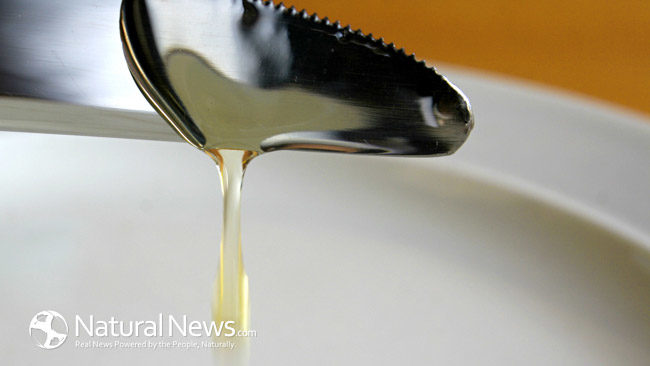In my early thirties I was hit with inexplicable debilitating joint pain. All of a sudden I was limping and barely able to button my own clothes. Do you have any idea how hard it is to retrieve items from a pant pocket when your finger joints feel on fire at the slightest pressure?
I was diagnosed with Rheumatoid Arthritis and put on prescription strength ibuprofen. Daily medication for the rest of my life to mask symptoms of a different problem didn’t sound like a ‘fix’ I should settle on. I began researching. I wanted to know why at my young age I was manifesting symptoms of rheumatoid arthritis. After all, isn’t that a geriatric problem?
What I found was that the culprit was right under my nose, literally. Through articles and forums I learned that many people were starting to relate their sudden onset of joint pain with high fructose corn syrup (HFCS). This struck a chord with me because at that point in my life I was a regular Mountain Dew drinker. There were many posts from people describing scenarios similar to mine. I immediately stopped drinking Mountain Dew. The pain in my joints mostly subsided. Spurred on by this experiment, I began avoiding any foods with HFCS, corn syrup, tapioca syrup or any other suspicious sounding sweeteners. Day by day I was feeling better.
The relation between HFCS and joint pain isn’t just a hunch shared by hundreds or thousands of pain sufferers on the internet. There is scientific proof of the correlation between the two. Unfortunately it seems that no matter how loudly it’s shouted over the web, it gets ignored by the main stream media. HFCS is structurally different from cane sugar (sorry, CRA!). Because of the differences between the two, HFCS can trigger a host of problems, including systemic inflammation. While HFCS does consist of a combination of fructose and glucose like sugar does, the ratio of those two is different in HFCS. The ratio of fructose is higher in HFCS (hence, ‘high fructose’ corn syrup) and the fructose / glucose molecules are unbound in HFCS while in sugar they are bound. Therefore your digestive tract has to work to digest sugar. Since fructose and glucose are unbound in HFCS, no digestion is required so it moves quickly into your blood system.
Now here’s the quick and dirty explanation of why HFCS is the devil for joint health. As I mentioned, the fructose in HFCS is not bound to the glucose in HFCS. This unbound fructose is hard for the gut to absorb and so it requires a lot of energy. It very quickly diverts and burns up the energy your gut would typically use for normal gut operations. This process essentially steals energy from cells and causes them to rapidly die off. The mass cell die off causes a chemical break down in the blood that produces uric acid. Uric acid is hell on joints. Producing so much uric acid so quickly makes it harder for the kidneys to filter and pass it out via urine. Uric acid then builds up in joints where it doesn’t belong. Your body then sees the uric acid as an invader and provokes an immune response, which causes joints to become red, hot and swollen.
If you have joint pain and you’re not satisfied accepting that it’s a random disease that you can do nothing about, try eliminating HFCS from your diet. I’m not saying ignore your doctor and treat yourself. By all means, consult a physician and get a diagnosis. But there’s no harm in cutting out known questionable substances from your diet to see if you feel better. HFCS is definitely questionable. Check out online forums to read what others say. Many people (like me) claim to have alleviated aggravating joint pain simply by banishing this one sweetener.
If you do choose to cut out the corn syrup, be conscious when picking sweeteners for tea and other things. HFCS could be hiding where you least expect it. I used to use honey. But joint pain started to creep back in. I found that just because its labeled honey doesn’t mean that it’s the all natural sweetener made by bees from pollinating plants and flowers. Its pretty standard for apiaries to over harvest honey from their colonies (because of greed), not leaving enough for the bees to live on during winter months. So to get the colonies through the cold season, guess what they feed them? HFCS. Consumers are fooled into paying good money for something that is mislabeled and bad for their health. It turns out it’s not very good for the bees either. The detoxification enzymes that make up bee’s immune system may be compromised if they are fed a diet of HFCS instead of the nectar they are made to consume. Real honey contains pollen grains.According to one study, the outer walls of these pollen grains have detoxifying genes and antimicrobials that most likely aid the bees in maintaining health and in fighting off the deadly effects of pesticides that they are inundated with these days (READ: colony collapse disorder). Feeding bees HFCS deprives them of the important immune support they get from pollen. So if you’re going to use honey, make sure to buy organic, raw honey (I buy mine at swansonvitamins.com). That way you are using pure honey and supporting ethical apiaries.
http://medical-dictionary.thefreedictionary.com/Uric+acid+crystal+deposition+in+joint
http://foodnhealth.tumblr.com/post/8741347810/how-fructose-and-hfcs-increase-uric-acid-and-give-you
http://healthfreedoms.org/2011/05/26/5-reasons-high-fructose-corn-syrup-will-kill-you/





